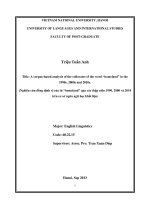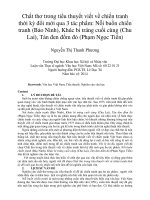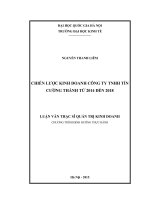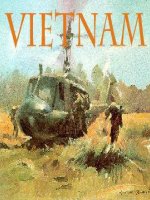Images of War (Time Life - Vietnam Experience)
Bạn đang xem bản rút gọn của tài liệu. Xem và tải ngay bản đầy đủ của tài liệu tại đây (37.25 MB, 200 trang )
The Vietnam Experience
sj-tr-<
•
I
\
4S
-
.
V
QWJMTi
Images
of
War
K
The Vietnam Experience
Images
of
War
by Julene Fischer
and the
picture staff of Boston Publishing
Text
Company
by Robert Stone
Boston Publishing Company/Boston,
MA
Boston Publishing
Company
Design: Designworks, Sally Bindari
Design Assistant: Emily Betsch
President and Publisher: Robert J. George
Vice President: Richard S. Perkins, Jr.
Editor-in-Chief: Robert Manning
Managing Editor: Paul Dreyfus
Marketing Director: Jeanne Gibson
Senior Picture Editor: Julene Fischer
Senior Writers:
Clark Dougan, Edward Doyle, David
Samuel Lipsman,
Fulghum,
Terrence
Maitland, Stephen Weiss
Senior Editor: Gordon Hardy
Picture Editors:
Wendy
Johnson,
Lanng Tamura
Business
Staff:
Amy Pelletier, Amy P.
About the
editors
Wilson
Editor-in-Chief Robert Manning, a longtime journalist, has previously been editor-in-chief of the Atlantic Monthly magazine and its press. He served as assistant
secretary of state for public affairs under
Presidents John F. Kennedy and Lyndon B.
Johnson. He has also been a fellow at the
Institute of Politics at the John F. Kennedy
School of Government at Harvard University.
Picture Researchers:
Julene Fischer, senior picture editor at
Boston Publishing Company, has headed
the picture effort for THE VIETNAM EXPERIENCE since just after the beginning of
the project. A graduate of the University of
Colorado, she received her M.A. in English from the University of Washington.
Katz Colman, Robert Ebbs,
Tracey Rogers, Nana Elisabeth Stern,
Shirley L. Green (Washington, D.C.),
Kate Lewin (Paris)
Archivist: Kathryn J. Steeves
Picture Department Assistant:
Karen Bjelke
Researchers:
Richard
Burke,
Jonathan Elwitt,
Sandra M. Jacobs, Steven W. Lipari, Michael Ludwig, Anthony Maybury-Lewis,
Nicholas Philipson, Carole Rulnick, Nicole van Ackere, Janice Sue Wang, Robert
J.
Yarbrough
Production Editor: Kerstin Gorham
Assistant Production Editor:
Patricia Leal Welch
Assistant Editor: Denis Kennedy
Editorial Production:
Sarah Burns, Theresa M. Slomkowski
spring 1967.
and authors:
Assistant Picture Editor: Kathleen A. Reidy
Nancy
Cover Photo:
Navy corpsman Vernon Wike tries vainly to save
the life of a wounded Marine under fire during
the battle of Hill 881 North, near Khe Sanh,
Robert Stone covered Vietnam in 1971 for
the British publications Ink and Manchester Guardian. His National Book Award-
winning novel, Dog Soldiers (1974), grew
out of his experiences there. In addition to
writing for LIFE, Harper's, the Atlantic
Monthly, and other periodicals, he has
published three other novels, Hall ol Mirrors (1967), A Flag for Sunrise (1981), and
Children of Light (1986).
1986 by Sammler Kabinett Inc. All
No part of this publication may
be reproduced or transmitted in any form or by
any means, electronic or mechanical, including
Copyright
rights reserved.
photocopy, recording, or any information storage and retrieval system, without permission in
writing from the publisher.
Library of
85-063001
Congress Catalog Card Number:
ISBN: 0-939526-18-2
Picture Consultant: Ngo Vinh Long is a social historian specializing in China and
Vietnam. Born in Vietnam, he returned
there most recently in 1980.
10
5
9
4
6
7
8
3
2
1
Contents
Preface:
Khe Sanh
The Shattered Mirror
Introduction
8
96
Tet!
108
Resisting the French
12
War at Home
124
Saigon
28
Withdrawal
146
46
The Easter Offensive
164
Strategy of Attrition
62
The End
176
The Other Side
80
Epilogue
188
War in the
Village
s*»1
Preface
The Shattered Mirror
was a war
home, while summoning the
no other. Americans
are virtually unanimous about that,
though they agree on few other certitudes
about the war in Vietnam. Each earlier
war left behind a widely accepted image
under
War
was brother against brother. World War
was the war to end all wars. World War
be the ones to
tance from
search out such an essence. For now, it is
challenge enough to assemble, with balance and sensitivity, the chronicle of those
twenty or more years of turbulent history
and the people caught up in its currents.
Part of that story is this volume of im-
It
or sense of
its
like
character. The Civil
I
II
was
fought to stop Hitler's Nazism
and
Tojo's imperialism.
The image
of
Vietnam
the
shattered mirror. In
its
ment
of
meaning
What
passage
or
a
private frag-
of
the
more than a decade,
essence or assess the meanlittle
lessons
learned
bloody involvement thousands
from
of
that
miles
war that contorted the
conscience and brought down
from our shores— a
national
the ruling political party?
born
let
of
noble ideals
An
enterprise
and impulses— yes,
us agree on that— but which, like some
prehistoric monster
the asphalt
edy?
A
lumbering blindly
swamp, descended
best of patriotism
fought in
into
into trag-
venture that brought patriotism
among
the
many who
Vietnam— Americans and South
and North Vietnamese?
dis-
the events will
ages, reflections glittering in the fragof
the broken mirror.
War was
the
most
brotherhood,
on both sides
The Vietnam
thoroughly
photo-
in
count. Pacification. Tonkin
Hanoi Hilton with
bloodied highway
torture rooms.
The
ironically called
the
its
Street of Joy.
Some
of
the most vivid reflections of
Vietnam came in the remarkable stream
of books written by those who fought in or
observed the war at close hand. One of
those writers
is
Robert Stone, whose novel
among the books
induced by the Vietnam War. He covered
the combat in 1971. Mr. Stone was invited
to
have the power to evoke images. Such words as courage, sacrifice,
Or other
memory like
the fighting.
won't go!" Pol Pot. The prison called
rillas.
Words
men
Gulf. Kent State. Boat people. "Hell, no!
We
Dog
in history.
of
time
that
their application to
buzz ominously
Body
insects.
The camera's
eye recorded it all— a GI sobbing over a
dead buddy, a naked Vietnamese child
fleeing a napalm attack, a Buddhist monk
being consumed by flames, an American
President brooding over events that have
broken from his control, the joyous return
of a hero from a Hanoi prison, the grisly
sight of villagers slain by Vietcong guer-
graphed combat
that
words
tenacity,
and again found
words
Historians blessed with greater
ments
or recollection.
simple expression can, after the
capture the
ing
is
shards, each on-
own
looker finds his or her
War
fire at
write the text for this volume, adding
to
his
of
Soldiers rates high
powerful word images
to the portfolio
photographs selected by our picture
editors
and
researchers. Together, they
assemble many fragments of the shattered mirror in which Americans can try
view the war
that
was
like
no
other.
too
—Robert Manning
know
their friends
was
It
Introduction
had seen and
had seen too.
that they
to
it
be sure
it
without form
but
itself,
it
could
assume an infinity of forms. It was as tiny
as a lizard's eye and as huge as the bad,
black
sky.
It
became
events.
It
became
things themselves.
It
was
how-
at the heart of every irony,
ever innocuous, however hideously cruel.
It
might appear as a droll incongruity
along some nameless road or as guilty
"There
it
is,"
they used to say in Viet-
nam. It was as if an evil spirit were loose,
one of the demons known to the Vietnamese as ma, weaving in and out of visible
reality, a dancing ghost. It would appear
suddenly out of whirl, shimmer for an instant, and be lost. People came to recognize it. Recognizing it, they would say
without excitement: "There it is," with emphasis on the
last
word
to let their friends
laughter over things that weren't funny.
was as palpable as a tumbling
was lacy as light, fine enough
right
and
into
confront you as
a grotesque insight.
It had no strength of its own because it
used human strength. It had no life of its
own because it used human lives with a
brave prodigality. Because it used so
many young lives it could assume a
thought,
bered images.
were comparisons
A medic at Chu
Pong, 1966.
seep
to
an oddly turned
youthful, frolicsome aspect.
this
It
your deepest inward places
page and the following three pages
appear some of the war's most remem-
On
bullet.
It
play
land.
its
It
Alice in
was
It
Wonderland
to
could disside.
Alice in
There
Through the Looking Glass and that there
was Lewis Carroll logic. Red Queen to
White Rabbit. There it is.
In
was
fact,
its
Lewis Carroll dimension
had all the obsessiveness of
Alice in Wonderland and about as much
justice and mercy.
Some people called it the Gray Rat,
This Shit, or The Show. Some called
Mr.
Gray Rat. A Marine I knew called Captain Gray Rat versus The World.
moral.
It
it
it
a peculiar nomenclature.
Among Union soldiers, the American Civil
War was called The Elephant. Before
Shiloh and Chancellorsville, some sergeant would inform the plowboys who
had never been in the line before that
they were Going to See the Elephant.
That was what going into combat was
There
exists
called then.
The Marine mentioned above was on
Operation Prairie around the Rockpile in
1967. In one fight during Operation Prairie, 32 Marines held off steady attacks by
Wonder-
said that everything
was
Awaiting evacuation. Hue,
:
'•V
.w
1968.
^>
^fe
Wjr
VV
yM
t.
w^
i
Jfi^
|
1'
'Al§
A
mJ
^S
'.*^'tH£
Army
and he was credited with a partial disability. He saw Captain Gray Rat versus
The World as a Saturday morning car-
would go them. "So the gunny goes— "You
been doggin' the bush, Smith?' So I go
"hell no, gunny!' " The average American
infantryman in Vietnam was seven and a
half years younger than his counterpart
in the Second World War.
In those days it was unsettling to hear
so much bitter whimsy from young Americans. Pre-Vietnam America had become
a stranger to irony. These youths and
their wit were brutally sophisticated.
They'd all caught a glimpse of the ma, the
toon in which you got killed.
war's infernal antic
300 North Vietnamese
two days.
Marx
It
was
called
regulars for
Groucho
said Op-
the
My
Marine friend
eration Prairie was a Walt Disney True
Life Adventure. He was badly wounded
there, so badly that the first doctor who
saw him decided to amputate his right
hand but changed his mind at the last
minute. The Marine's hand was saved
Battle.
Understand how young a
lot of
people were. Their youth
factor in
how
spoke.
For ex-
they thought
and
ample, they would not say things, they
Below. The crush
to
escape.
Nha
"There
these
was a
Trang,
it
is!"
it
itself, but what was it?
Whether they knew it or not, everyone
was looking for a metaphor.
A napalmed tiger was a metaphor
was, the thing
answer
It
was Captain Gray
to culture shock,
and The
of
dreadfully, he might
relativity of things, the Fool
anywhere.
kill
hospital
through a rice
namese
back of
the
same
to
became
well.
Hill.
his
corpsman
field
The
is
running
carrying a small Viet-
been shot off the
water buffalo by the Fool on
child.
child, the Fool
Forest, the tigers
was
it.
A
beguiled. The colonial hunting preserves
Minn
motion
He saw an essential gookishness
deep down things, and he kept trying to
the
corpses might find themselves inciner-
All
might turn his
him.
World's revenge on Nam, mysterious Asia
ated on a hunch. Burning bright in the
Alone
above a grapefruit patch, issued amphetamine to keep him alert, seduced by the
1968.
for
be a duly authorized
friendly sniper turned free-lance.
Rat's
prowling
Nobody and
was innocent, or free, or neutral.
There was a metaphorical figure
known as the Fool on the Hill, a figure of
legend, compounded of fear and morning
mist. The Fool might be hostile; bombproof, bulletproof, Luke the Gook. More
1975. Bottom. Street execution. Saigon,
free fire zones. Tigers
innocence.
nothing
fire
spirit.
they would say. There
rich in implication.
bankruptcy
child's
Not content with shooting the
has popped the buffalo as
The corpsman runs with the bleeding child, making for dry ground, risking
U
demonstrated the
On
Mutter's Ridge. Operation Prairie, 1966.
.
submerged punji sticks and immersion
foot. He knows the next thing the Fool will
shoot may be him.
Eventually, il it were certain he was
friendly, and il there were time, someone
would have to go talk to the Fool and get
him down and try to make him well
"Talk not
Ahab
me
to
replied, "I'd
He
blasphemy, man,"
strike the sun if it inof
an ab-
pondered a moral dilemma. Reasoning
carefully, he decided the Vietnam War
was wrong. He
again.
great American novel
dad and
went to Canada. In Canada he began to
think he might have taken an easy way
out. He came back and took the draft and
went as a medic.
He was sent to I Corps, a known
enraged the Fool with their
basically foolish appearance. But anyone—a bored door gunner, a senior officer on his way to an inspection— might
have a shot at a buffalo. Buffaloes didn't
seem innocent. They chased people and
they hated grunts. It was stupid to be
chased by a buffalo. The animals were a
useful metaphor because the human dimension was so painful and so hard to
passion
conshy, looking out at
Buffaloes
a moralist
was going
It's
to fix
oil.
it.
not gratuitous that
for control
no one
Moby Dick
is
.
and Ahab, with his
and his "can do" spirit,
at
all.
Laos,
we
They achieved complete astonishment as
the
first
elephant exploded.
Once a young man from Missouri, an
earnest German-American farm boy,
slow spoken, Catholic, and bespectacled,
1
n r^z^^W
\.
i^f
•*.»£!&£
^Ki
r
e
%*
x
r
™
^^^^9*
•
'
b!
m *¥
H
Kf*
'
4
wt
,
to.'
10
the
used Cobra gunships
against elephants on the Ho Chi Minn
Trail. Descending like gigantic insects,
the Cobras achieved complete surprise.
In
1966.
1
in
for
He was
an immoral world and he
straction like victory or for the
for
race against death. Operation Prairie,
„
it
an American hero. Ahab started out
chasing the whale because it represented
everything that was wrong with the
world. By the end of his disastrous voyage, no one remembered where goodness resided and the whale and the
whalers went down together in a victory
"Vengeance on a dumb brute
seems blasphemous." So the Quaker
Starbuck in Moby Dick sought to reason
with Captain Ahab.
A
wasn't doing
is
think about.
.
sulted me."
weak
talked to his
all
it
with his honest
When
he told them he
wouldn't carry a weapon, they made him
blue eyes.
carry everybody's
weapon on
home. They kept
up
bush.
When
it
the
way
amwent down and
until the first
the point
called for a medic they waited to see
if he
would go, and he went. They found out he
would always go. Everybody loved him
because he was without a grain of meanness, he liked to talk about important
Below. Convoy of tears.
Bottom. Kent State, 1970.
Highway
1,
1975.
and he had so much heart. Time
passed. When he was short, his time in
country nearly elapsed, no move was
and
made
were being
smuggled out to The World in them.
People said "there it is." It sounded a little
too right to be true, but eventually the CID
arrested some individuals at Aberdeen,
Maryland, and their accomplices at Bien
things,
keep him out of the line. Other
people complained on his behali; he said
not a word.
to
At that time they
were
on the Laotian border
in
fighting for hills
Corps. People
I
were confused. The American command
declared that it was not a war of hills. On
one hill, they lost fifty-six men, and a general explained that the "hill had no military value whatsoever." There seemed to
be a contradiction.
In these worthless hills the
to hurt
man
him he was out
of
When
He
wounded men mints as
everything.
went back
to
The World
liked
in
a
fight
they killed
of
almost
placebos.
a
Hoa. Millions
purest heroin
KIAs.
folding
the
DMZ.
1966.
was being
flown
be
to
in
of
the
with the
true after
all.
is,"
was
we
just
rumor.
said,
in
our great
sweep for metaphors. We never determined quite what it was. No single image
of
control.
wash
fiery
Its
burned people down
lescents into bags of garbage, sucked a
million
people
out
of
turned them into their
we
The images
embers.
own
carried
away
der in his classic study, The
most 500 years
old, the
are
its
it.
the historian
Renaissance, treated with
and
flayed ghosts.
We will never forget
Decades ago,
skin,
their
Ralph Roe-
Man
of the
a war now
invasion
al-
of Italy
by King Charles VIII of France.
"Swollen by the confluence of so many
causes," Roeder wrote, "it advanced like
some complex, blundering, uncontrollable
force which absorbed its own authors,
and which assumed more and more the
featureless and irresistible likeness of
fate."
served.
the
It
He
ning
box
it
was
of
us.
It
was
them.
death— the destroyer
It
It
was
the cun-
dice play. The smoke, the rain,
girls in the
Humping. Near
worth
dollars'
of
turned out
It
"There
bringing
in
said that drugs
remains. That part
morphine, out
was
was
It
and they
from Missouri died
twenty-four hours long.
Strange rumors circulated about cof-
medic up.
They wanted the medicine
would kill the medic to get it.
The
lieved.
fins.
spinning out
and processed ado-
Then it was said that the gang at Aberdeen had missed one, and an undertaker
in some tank town opened his son's coffin
and found a bag full of smack beside the
enemy
the point to bring the
no longer mattered what he be-
it
of
boom-boom
was a mistake
worlds,
and
the
rooms.
10,000
miles long,
Napalm
strike.
Highway
1,
1972.
11
Resisting the French
Vietnam's
resistance
commenced even
completed
their
the
second
The
situation of
against
the
to
before the
conquest
French
had
latter
Indochina
of
in
half of the nineteenth century.
a small country struggling
an imperial power was one the
Japanese seized direct control of Indochina only to surrender it in defeat to the
Vietrninh. After over 100 years of
rule,
the
whole
French
Vietnam had an
of
in-
digenous government.
Ho Chi Minh counted on
his cordial
changed. Her wartime
had come
anticolonialist pol-
seem naive and even
treacherous. China had been "lost" and
grave accusations exchanged that would
paralyze the country's Asian policy for a
icy
to
Some
generation.
strategists professed to
Vietnamese understood profoundly. Hav-
relationship with the United States to pro-
China for centuries, they
knew all the weaknesses of an empire at
war and all the advantages accruing to
tect
Vietnamese autonomy. American pol-
an American interest in any antiCommunist war. America must bear any
icy
seemed
burden,
the guerrilla.
theater of war,
Beyond the limited circle directly profiting by French authority, the desire to be
rid of French rule was universal, embrac-
French
At one point, beset by Chinese pressure in the north and the arrival of British
Vietnam. She had forgotten that in 1945
ing all social classes. But the strongest
troops determined to install the regroup-
an American
and most enduring faction of the independence movement was that controlled
by the Communist party of Vietnam. This
was due in great measure to the fact that
the
most influential and resourceful
ing French,
Ho requested
States take
Vietnam under
ing
resisted
fighter for
Vietnamese independence was
also one of the founding fathers of the
Comintern, the
man known
to his
early
favor the Vietminh.
to
United States, predominant
opposed the
in the
The
Asian
restoration of
control. His request
was
that the United
temporary
its
declined, but at
Hanoi proclaiming an independent Vietnam, Ho announced his
Vietnamese Declaration of Independence
based in large part on America's.
Supported by Britain, the French rein
by the nom de guerre Nguyen Ai Quoc and later to all the world as
were
Ho Chi
France's colonial wars. Time after time,
collaborators
Minh.
During World
War
a weak Vichy
II,
regime governed Vietnam
ance
of
tory,
Ho
Japan. Foreseeing
in force.
Quite soon,
engaged
in
jungle that suffocated conventional armies.
Monsoons and
trees
made
the Japanese.
part of the year.
American
Command came
to
forces
of
recognize the
Vietminh as the authentic representative
of the Allied
close
war
effort in
Indochina.
collaboration developed
American OSS
operatives
A
between
and Ho's guer-
12
air
canopy of
support difficult a large
the high
The enemy was skillful and ruthless,
avoiding engagement, then striking at
the
war turned
against them, the
was
said, to
preserve the free
world her power had created. Her power
was vast, a mighty force for good.
be secure. It was a dirty war, fought under demoralizing conditions. By 1954, the French
were fighting their last losing battle at
sea-horse-shaped
clared in his
man was
"Lesser
Dragon"
intelligence officer
last
of
had de-
report that the white
"finished"
in
Southeast Asia.
She had forgotten her fierce, indomitable
wartime allies and their ruthless, singleminded rejection of foreign control.
France, free of its dirty war, watched
with some cynicism as America began
the process of involvement in Vietnam.
The advance guard of the American
Presence appeared in Saigon, and many
found Vietnam charming, with its flame
trees,
cafes,
and
lovely
women. At
the
a French scholar was writing
of French soldiers' agony as their road
came to an end at Dien Bien Phu. Place
names along that road— Ban Me Thuot,
Dak To, An Khe, Hue— would one day be
familiar in remote American towns. The
Frenchman's book was entitled, Hell in a
same
time,
Very Small Place.
isolated posts or in cities thought to
Dien Bien Phu.
rillas.
As
of
carefully
tional guerrilla tactics effectively against
China
bitter
From
their
jungle redoubts, his Vietminh used tradi-
the
most
armies
Allied vic-
consolidated the resistance.
Eventually
the
their
planned "encirclements"
ended in frustration. The terrain was hellish. Sixty percent of the country was a
at the suffer-
an
turned
it
America's attention turned toward the
rule.
ceremonies
detect
In
the interim,
America's
mood had
Vietnamese nationalists are hauled off
jail under the watchful eye of a French
guard in the fall of 1945.
to
13
14
On August
19, 1945,
1,000 Vietminh sol-
Hanoi
drum up support for
Ho Chi Minh, who
was to declare Vietnamese independence three weeks
diers entered
later.
oi
to
Here, thousands
Hanoi residents
gather in front of the
Opera House as
their
revolutionary stan-
dard
is
unfurled.
15
.-•""*
Above. Ho Chi Minh proclaims independence {or Vietnam in Hanoi on September
2,
1945.
war
with the resurgent
Below.
Right. Preparing for
(with
French colonial force in late 1946, Vietminh
soldiers dig trenches inside the former residence of the French governor-general in
Ho 's lieutenant, Vo Nguyen Giap
plaid tie), and Major A.L.A. Path of
the U.S. Ofiice ol Strategic Services
right) salute the flags of their
August
16
26, 1945.
(to
his
two countries,
Hanoi.
17
18
Ho Chi Minh
inspects
a Vietminh guerrilla
unit in
Cao Bang
Province, near the
Chinese border.
Driven from Hanoi,
Ho
directed resistance
to
the
renewed
colonial
French rule from his
jungle headquarters.
19
Above. Oiiicers' evening mess at a French
Phu Lo in the Red River Delta, early
1951. Later that evening the Vietminh attacked the post.
post at
20
French reinforcements sent north
from Saigon crowd the decks of an AmeriRight.
can-built landing craft in
January
1951.
Ha Long Bay in
21
WL









